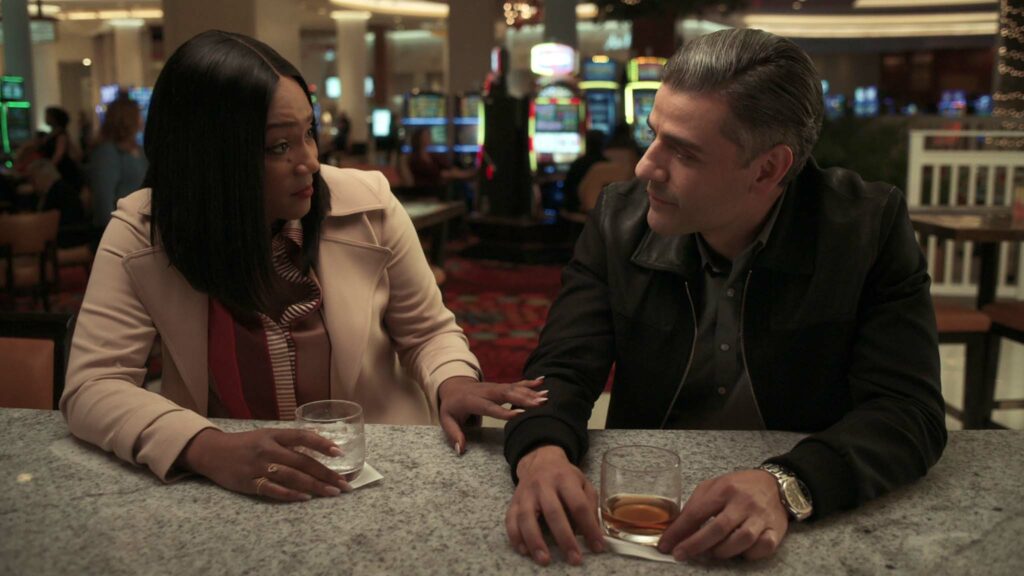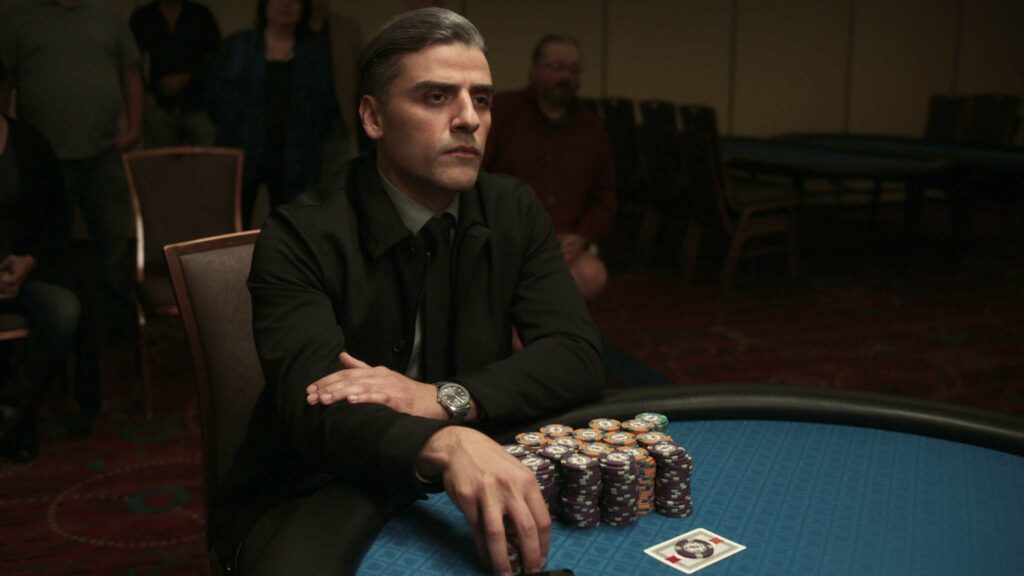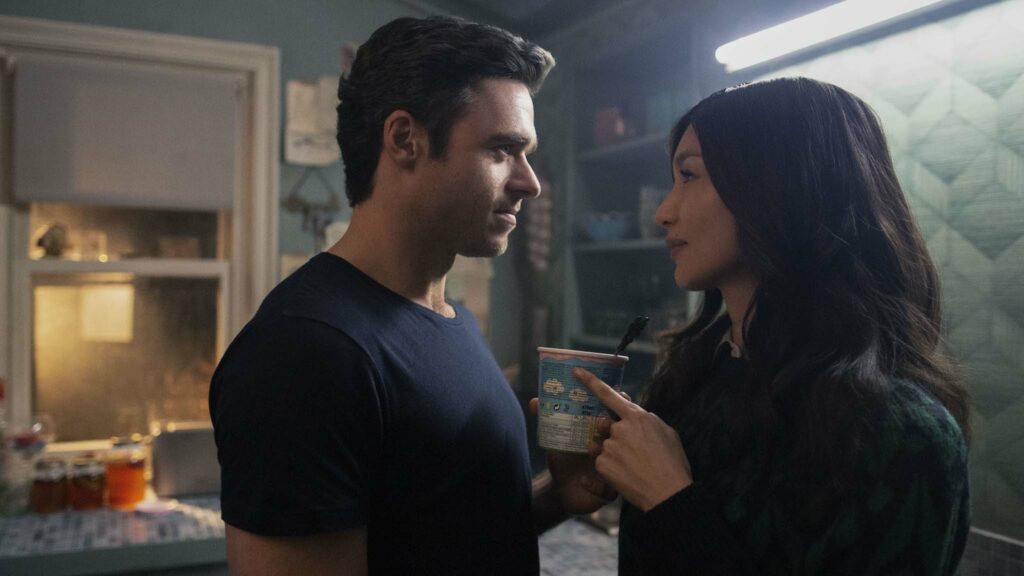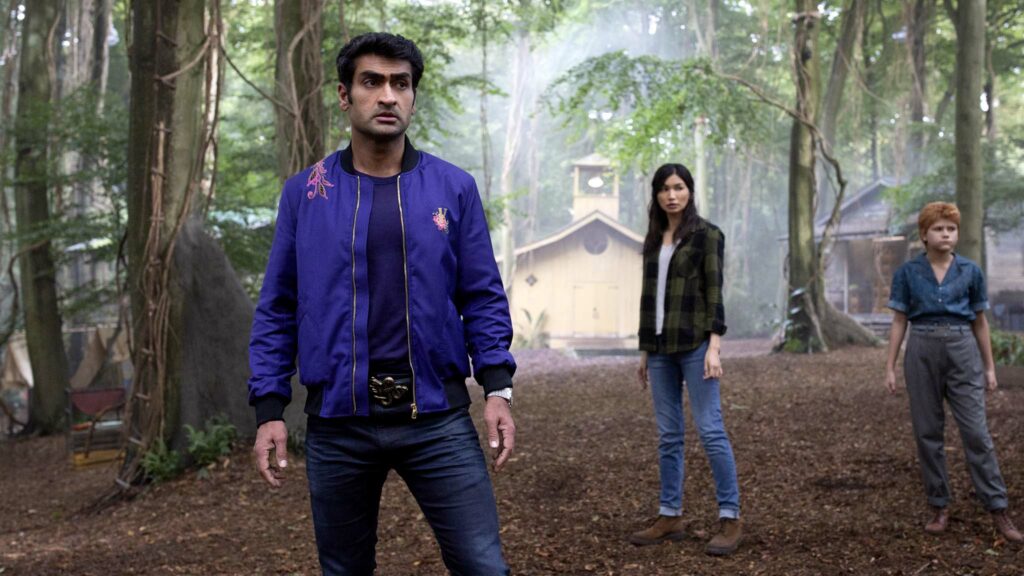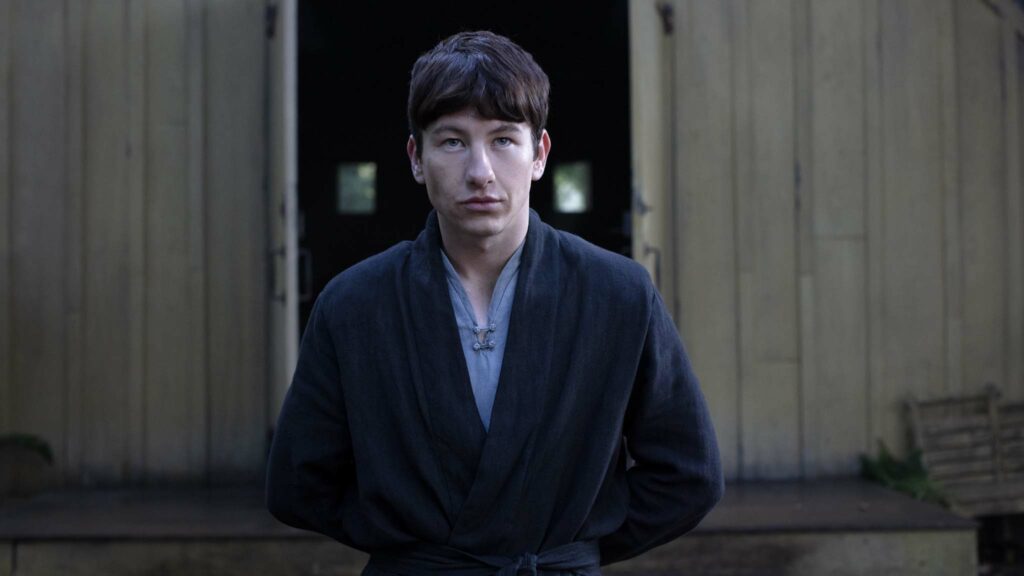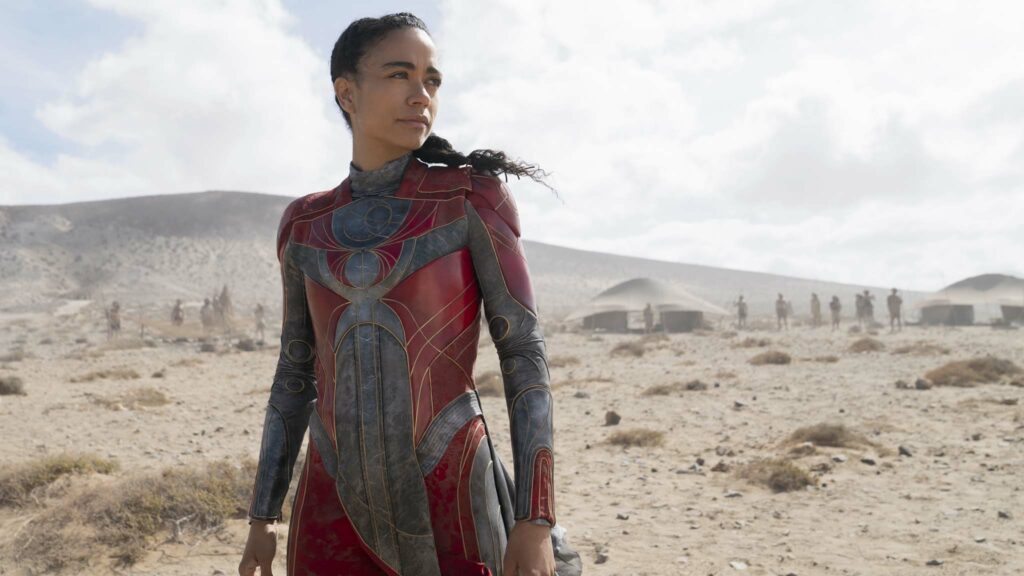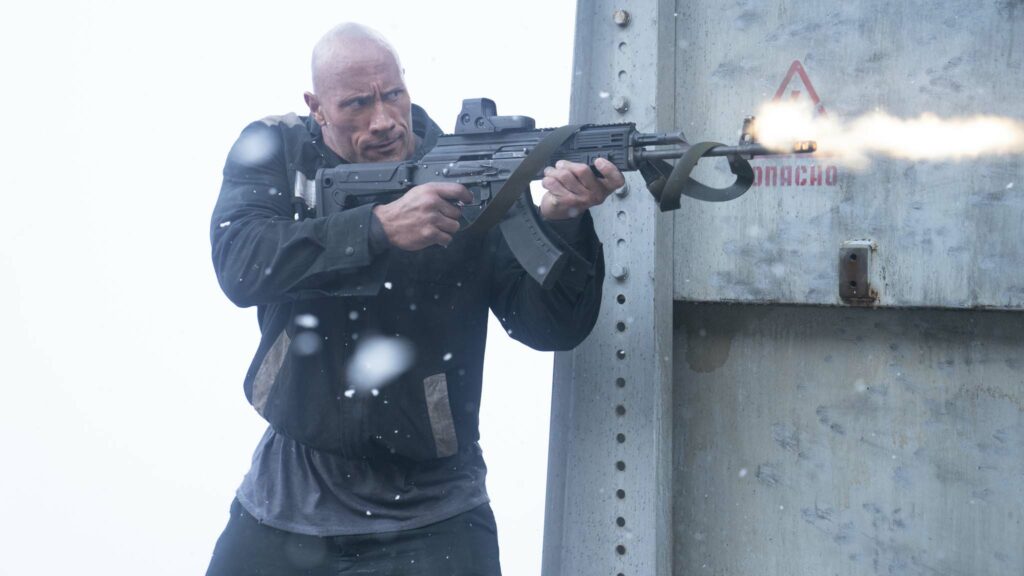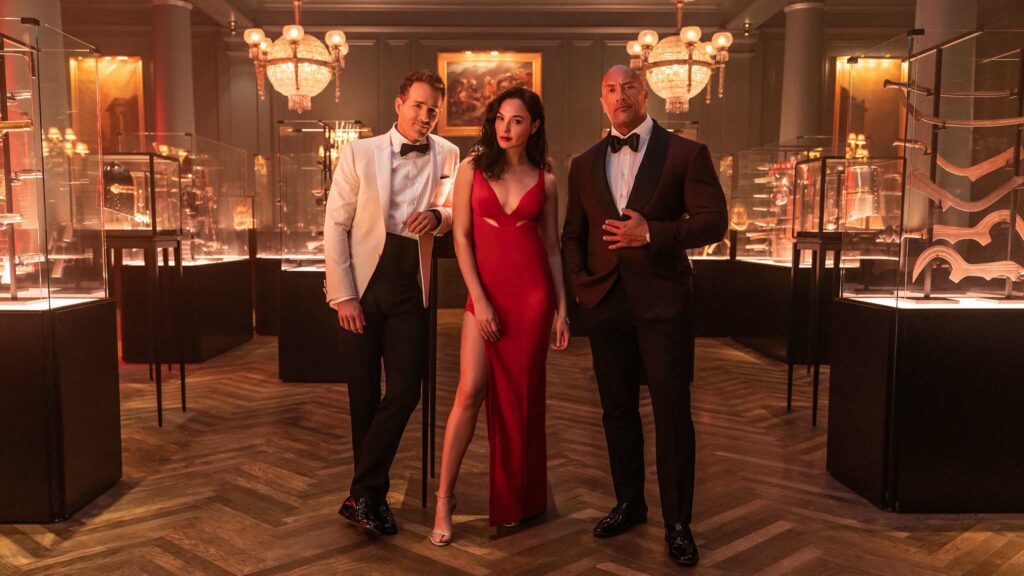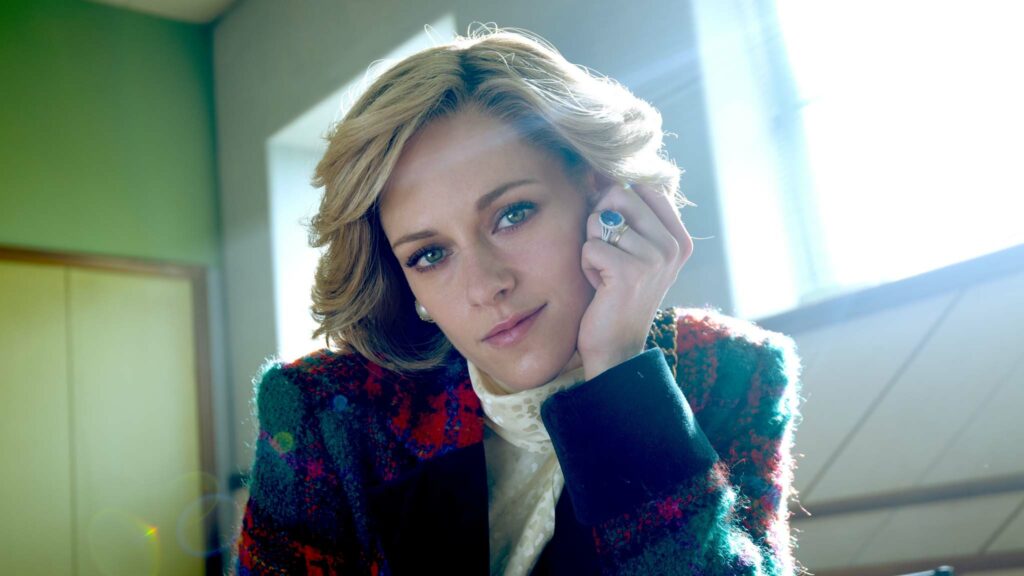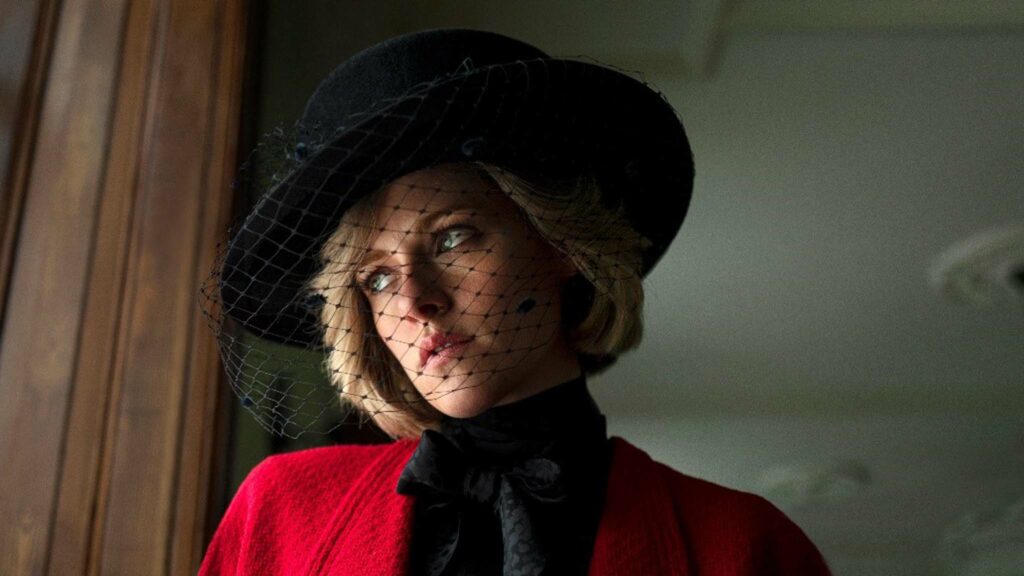Thriller
The Card Counter (15)
Review: Blackjack and poker rely on skill, luck and nerve, which can be enhanced by the unethical practice of counting cards to predict the odds of the house or another player possessing a winning hand. Writer-director Paul Schrader’s slow-burning thriller illustrates the basics of counting in an early scene, suggesting we are being dealt another battle of wits and bravado at a card table. Indeed, when a veteran hustler (Oscar Isaac) takes a fresh-faced protege (Tye Sheridan) under his wing, there are echoes of the surrogate father-son relationship of Paul Newman and Tom Cruise in The Color Of Money.
The young disciple doesn’t share his mentor’s passion for gambling and when he is asked about their tour of casinos, the protege responds: “It is repetitive. I don’t know that it feels like it’s going anywhere.” Schrader’s film elicits similar feelings for the opening 45 minutes but once the filmmaker reveals his true intentions – to picks at the scabs of America’s guilt about its response to the September 11 attacks – The Card Counter ramps up suspense and chokeholds our attention. Flashbacks to Abu Ghraib using a disorienting fisheye lens, which distorts prisoner holding cells into an endlessly curving tableaux of degradation and humiliation, powerfully convey the shame that fuels the lead character’s questionable choices.
William Tell (Isaac) travels between casinos around his favourite hunting ground, Atlantic City, winning modest amounts to remain under the radar. He refuses to stay at convenient on-site hotels, preferring rundown independent motels so casino owners can’t gather his personal data. At one location, William attends a conference where Major John Gordo (Willem Dafoe) delivers a speech on the role of facial recognition technology in global security.
Sitting in the audience is Cirk (Sheridan), son of a Roger Baufort, who served with William in the military. It transpires that William served eight and a half years in Leavenworth penitentiary for his role in the torture of prisoners at Abu Ghraib. William invites Cirk to join him on the road so he can secretly pay off Cirk’s debts with his winnings from a World Series of Poker tour as part of a syndicate of players managed by La Linda (Tiffany Haddish). Luck isn’t on William’s side.
The Card Counter builds steadily to an explosion of violence that recalls the nerve-jangling denouement of Schrader’s last film, First Reformed, which earned him an Oscar nomination. Isaac is a tightly wound ball of emotion, whose tough exterior shows chinks of humanity in playful scenes with Haddish. When La Linda tells William: “You have to be the strangest poker player I ever met,” we nod in silent agreement. The William/Cirk narrative arc feels frustratingly light given its pivotal role in the film’s overall design. In that respect, Schrader raises stakes and we call his bluff.
Find The Card Counter in the cinemas
Action
Eternals (12A)
Review: The repercussions of the Avengers’ decision to reverse The Snap continue to ripple through the Marvel Cinematic Universe (MCU) in Oscar-winning director Chloe Zhao’s origin story for a new supergroup of otherworldly protectors. Set after Bruce Banner wields the Infinity Gauntlet in Avengers: Endgame and snaps his fingers to restore beings in the universe eliminated by Thanos, Eternals initiates a seven-day countdown to a cataclysmic event called the Emergence, which will render humanity obsolete.
An opening crawl, a la Star Wars, succinctly distils a new mythology that dismisses the Big Bang Theory and introduces an ancient race of beings known as Celestials, led by the mighty Arishem, which have shaped our universe for millennia. When monstrous entities called Deviants infest the Earth in 5000 BC Mesopotamia, Arishem fashions humanity’s superpowered protectors, the Eternals. For more than 7,000 years, this band of near-immortal saviours have lived among us, in plain sight but unseen.
They are instructed not to interfere in human conflicts unless Deviants are involved, and watch with dismay as humans resolve differences with bloodshed. After a monstrous mushroom cloud rises above 1945 Hiroshima, one Eternal angrily remarks: “These people – they’re not worth saving.” Zhao’s script, co-written by Patrick Burleigh, Ryan Firpo and Kaz Firpo, tests that bitter sentiment and the gossamer-thin moral threads separating heroes from villains to breaking point using one of the most diverse, inclusive teams in the sprawling MCU.
Deaf actress Lauren Ridloff communicates with her fellow Eternals in American Sign Language, Brian Tyree Henry portrays one half of the franchise’s first openly gay relationship and the ranks are filled with strong, powerful women including the group’s spiritual leader, played by Salma Hayek. By shifting the focus away from special effects-laden action set-pieces and on to character arcs and storytelling, Zhao bloats the running time to an uncomfortable two-and-a-half hours and delivers arguably the least adrenaline-pumping Marvel escapade to date.
It’s a brave new world and she reduces dramatic momentum with copious flashbacks to 575 BC Babylon, 400 AD in the Gupta Empire and 1521 AD Tenochtitlan to illustrate bonds between the Eternals’ leader Ajak (Hayek), who possesses the power of healing, and dutiful acolytes Ikaris (Richard Madden), Sersi (Gemma Chan), Kingo (Kumail Nanjiani), Sprite (Lia McHugh), Phastos (Tyree Henry), Makkari (Ridloff), Druig (Barry Keoghan), Gilgamesh (Don Lee) and Thena (Angelina Jolie). When the Emergence triggers the re-emergence of Deviants, Eternals risk everything – including their sworn allegiance to Arishem – to determine mankind’s fate.
Eternals bears Zhao’s fingerprints as the most emotionally intimate Marvel story to date, and while it’s an ambitious adaptation of the comic books in many respects, including an artfully composed al fresco sex scene, some conventions remain, including tantalising scenes embedded in the end credits. The first humorously teases one direction for the franchise’s next chapter while a second hints at a character’s complicated family history dating back to medieval England.
Flecks of humour, courtesy of Nanjiani and Tyree Henry, are extremely welcome as are the few occasions when scriptwriters exercise brevity – like a verbal allusion to Peter Pan to untangle a messy love triangle. “Eternals will return…” promises a final title card before the screen fades to black. Hopefully that will include Zhao behind the camera to further enrich this fantastical microcosm of the Marvel universe.
Find Eternals in the cinemas
Action
Red Notice (12A)
Review: Three of the biggest (and most expensive) stars in the glittering Hollywood firmament – Dwayne Johnson, Ryan Reynolds and Gal Gadot – wisecrack, trade blows and wilfully defy the laws of physics in Rawson Marshall Thurber’s entertaining but lightweight escapade. Red Notice is soaked in nostalgia for old-fashioned treasure hunts a la Raiders Of The Lost Ark and Romancing The Stone.
It’s no coincidence that Reynolds’ thief absent-mindedly whistles composer John Williams’ theme for Indiana Jones as he descends a staircase. Later, in a vast warehouse of priceless artefacts, he tells Johnson’s fugitive to “Look for a box that says MacGuffin” pointedly referencing a meaningless object employed by scriptwriters to nudge along a plot. Reynolds’ self-referential nods and winks are fun but they feel like a dilution of the Canadian actor’s reliable shtick as Deadpool.
The male leads catalyse a lightly effervescent double-act while Gadot trades in sensuality and strength, most notably in a sexually charged tango sequence with Johnson that echoes a dance d’amour from True Lies. Writer-director Thurber, who worked with Johnson on Central Intelligence and Skyscraper, indulges his love of overblown action sequences with a breathless chase along collapsing scaffolding and an explosive jailbreak that asks us to believe one of the actors has ninja-like reflexes to dodge a surface-to-air missile. The budget is clearly huge but the thrills are decidedly modest.
John Hartley (Johnson) is a top profiler in the FBI’s Behavioural Analysis Unit, who uses his knowledge of the criminal mind to outwit art thief Nolan Booth (Reynolds) during the attempted robbery of one of Cleopatra’s fabled golden eggs from a museum in Rome. Interpol agent Inspector Urvashi Das (Ritu Arya) and her team work alongside Hartley to catch Booth in the act and consign him to a Russian gulag. Duplicitous rival art thief The Bishop (Gadot) subsequently frames Hartley and he is condemned to a grim future as Booth’s cell mate while she prepares to steal the jewelled eggs for an Egyptian billionaire, who has offered 300 million dollars for all three trinkets as a wedding present for his daughter.
The most challenging target will be the private art collection of vicious gangster Sotto Voce (Chris Diamantopoulos), whose hi-tech security system is amusingly described as “always watching, always listening – kinda like Alexa, except with guns”. Hungry for revenge, Hartley reluctantly joins forces with Booth to break out of their snowbound mountaintop prison, take down The Bishop and restore his tattered reputation.
Red Notice plays to the strengths of the three leads but doesn’t stretch anyone or upend our expectations of a glossy, globe-trotting chase that repeatedly puts pyrotechnics ahead of plausibility. A couple of satisfying kinks in Thurber’s script are telegraphed in advance but don’t spoil our enjoyment, keeping a flimsy plot in motion and baiting hooks for a potential sequel. That seems a remote possibility considering the limited bangs for big bucks on display.
Find Red Notice in the cinemas
Drama
Spencer (12A)
Review: Billed as “a fable from a true tragedy”, Spencer imagines turmoil and tantrums behind the impeccably hung curtains of the Sandringham estate during the three-day Christmas celebrations in 1991. It would be the final Yuletide before Andrew Morton’s explosive biography Diana: Her True Story and the formal announcement from Buckingham Palace that the Prince and Princess of Wales had decided to separate. Pablo Larrain’s hallucinogenic picture, penned by Steven Knight, begins with the military-escorted arrival of ingredients for Royal Family’s feast: a lavishly choreographed spectacle awash with lobsters and poultry that wouldn’t seem out of place in a period drama like The Crown.
Spencer deviates from chocolate box convention and hews more closely to the unsettling disorientation of Larrain’s 2016 picture Jackie, depicting a suffocating world of ritual where guests are weighed on arrival to prove they have gained at least three pounds as evidence of their gluttonous enjoyment. For Diana (Kristen Stewart), in the vice-like grip of bulimia, the indignity of sitting on scales is just one of many ways she feels she is being set up to fail. “You have to make your body do things you hate… for the good of the country,” quietly explains Charles (Jack Farthing).
It is a brief moment of peace before wrenched sobs over toilet bowls and repeated costume changes into meticulously labelled outfits chosen by the Prince of Wales for his wife to wear under the scrutiny of equerry Major Alistair Gregory (Timothy Spall). Stewart delivers a riveting, tour-de-force performance that marks her as a frontrunner at next year’s Oscars. She adopts some of Diana’s mannerisms and vocal speech patterns to vanish completely in the role of a mother who dotes on her boys and develops a grim fixation on the fate of Anne Boleyn (Amy Manson).
In one of the film’s most striking sequences, Diana imagines tugging furiously at pearls around her neck – identical to white beads gifted by Charles to Camilla – and spilling the lustrous white orbs into a bowl of soup, which she gulps down to the point of choking. “Will they kill me?” she asks Royal head chef Darren McGrady (Sean Harris) after she runs uncomfortably late for arrival at Sandringham.
Spencer lets those words linger in the air before continuing its woozy whirl through state rooms, trading paranoid glances with other members of the Royal Family including Queen Elizabeth II (Stella Gonet) and the Duke of Edinburgh (Richard Sammel). Knight’s script takes creative liberties to imagine fever dreams and conversations behind closed doors, spinning Diana’s world out of control and us with her. We can hold on tight but Larrain doesn’t afford his tearful and tormented Diana that luxury.
Find Spencer in the cinemas


